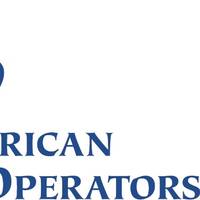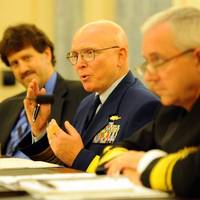Congress Responds to COVID19 and Other Challenges for the Maritime Industry

In response to the worldwide COVID-19 pandemic, the Congressional Research Service released a report that stated global economic growth has declined by 3% to 6% in 2020 with a partial recovery predicted for 2021. Also, the GDP of the U.S. has fallen by 5% in the first quarter 2020. According to the International Maritime Organization (IMO), the maritime industry, and seafarers themselves, have not been able to escape the significant effects of this crisis.All sectors of the maritime industry have been adversely affected by the global pandemic.
K&L's Gorton Stresses Critical Role of Jones Act
A former member of the 9-11 Commission recently wrote in The Hill that an “often overlooked” benefit of the Jones Act is its role in homeland security and border protection. Former U.S. Senator Slade Gorton and former state attorney general and homeland security expert from the Commission, said he finds border security the Jones Act’s “most vital benefit” in addition to its economic benefits of supporting more than 500,000 American jobs and the nearly $100 billion it fuels into the U.S. economy every year. The complete article written by Mr. As homeland security and border control remain a top priority among presidential candidates, one important provider of that security is often overlooked—the principal role the domestic maritime industry plays in securing America’s borders.
Will Congress Pass Any Maritime Legislation in 2014?

Following its usual summer break over August 2014, Congress came back from its five-week summer recess and spent a whopping eight days or so back in session before recessing once again, approximately a week early, to hit the campaign trail for the November elections. This essentially means that including the summer recess, Congress will have been in session for a total of about eight days between the end of July and the middle of November 2014. No wonder why Congress has not been able to accomplish much this year, to date.
AWO: Senate Bill Would Protect Marine Environment

Bipartisan legislation introduced by Senator Mark Begich (D-AK) and nine co-sponsors would establish a strong, nationally consistent standard for ballast water and other vessel discharges, bringing good news for the marine environment and for maritime commerce, the American Waterways Operators (AWO) announced. S. 3332, the Vessel Incidental Discharge Act, would require the U.S. Coast Guard to implement the most environmentally protective ballast water discharge standard achievable by existing technology.
U.S. Snub on Cutter Funds Seen as Threat
The Obama administration’s failure to budget $1.6 billion for two of the Coast Guard’s flagship vessels is drawing criticism from U.S. lawmakers, who contend that the service’s missions will be threatened. The Department of Homeland Security’s proposal for the fiscal year, beginning October1, requests $683 million to fund only the sixth of eight planned National Security Cutters, made by Huntington Ingalls Industries Inc. The agency, which oversees the Coast Guard, didn’t seek funding for the remaining two cutters for fiscal years 2014 to 2017. The 418-foot-long cutters are needed to replace an aging fleet of vessels, many of which are more than 40 years old and expensive to maintain, according to the service.
Admiral Papp: USCG Not Ready for Arctic Ops

Coast Guard Commandant Adm. Bob Papp testified before the U.S. Senate Commerce, Science and Transportation Committee Oceans, Atmosphere, Fisheries and Coast Guard Subcommittee on defending U.S. economic interests in the changing Arctic. During the hearing, Adm. Papp discussed America’s position as an Arctic nation, the Law of the Sea Convention, and need to complete construction of at least eight national security cutters. “Operations in the Arctic’s extreme cold, darkness and ice-infested waters require specialized equipment, infrastructure and training.
AWO: Need for Congress to Enact Vessel Discharges Legislation
Friday’s decision by the U.S. Court of Appeals for the D.C. Circuit to reject three maritime industry associations’ challenge to the U.S. Environmental Protection Agency’s (EPA) Vessel General Permit (VGP) highlights the urgent need for Congressional action to establish a uniform and practical regulatory regime for vessel discharges, The American Waterways Operators (AWO) announced today. The VGP was developed by EPA in 2008 under the Clean Water Act National Pollutant Discharge Elimination System (NPDES) permitting program, designed to regulate discharges from land-based stationary sources. The permit contains baseline requirements established by EPA as well as more than 100 state- and waterbody-specific conditions required by individual states.
AWO Testifies Before Congress
The American Waterways Operators (AWO), the national trade association for the tugboat, towboat, and barge industry, urged members of the House Transportation and Infrastructure Committee to enact legislation that establishes a national framework for the regulation of vessel discharges at a Congressional hearing yesterday morning. Testifying before the House Coast Guard and Maritime Transportation and the Water Resources and Environment Subcommittees on behalf of the Shipping Industry Coalition, AWO President & CEO Thomas Allegretti told lawmakers that the current patchwork of authorities with respect to vessel discharges regulation is antithetical to environmental protection and economic growth. Under the current system, the U.S.
Cummings Issues Statement on Deepwater
Mr. As Chairman of the Subcommittee on Coast Guard and Maritime Transportation, I rise today in strong support of H.R. 6999, the Integrated Deepwater Program Reform Act of 2008. This legislation is based on similar Deepwater reform legislation, H.R. 2722, which passed the House by a vote of 426 to 0 last year, and on S. 924, which passed the Senate by unanimous consent. · Chairwoman Cantwell and Ranking Member Snowe of that Committee’s Subcommittee on Oceans, Atmosphere, Fisheries and Coast Guard. Each of these Members worked to craft the thoughtful and measured legislation before us – and I applaud their leadership and their dedication to ensuring effective management and oversight both of the United States Coast Guard and of taxpayers’ resources. Mr.
Legal Beat: At Sea with U.S. Maritime Security
By Dennis L. The U.S. Coast Guard issued its final regulations implementing the Maritime Transportation Security Act of 2002 (MTSA). These regulations replace the interim rules issued on July 1, 2003 and take into account comments received thereon. Few substantive changes, though, have been made. The majority of the changes are in the nature of clarifications. The submission date for security plans was changed from December 29 to December 31, 2003. Vessel and facility security plans must be in full effect not later than July 1, 2004. Various alternative security programs submitted by specialized industry groups were approved. Overall, the Coast Guard is to be congratulated for its development of a program for enhancing U.S.
$7.9B USCG Reauthorization Approved by Subcommittee
Legislation to authorize more than $7.9 billion for the Coast Guard for Fiscal Year 2005, including $1.1 billion for the Deepwater project, was unanimously approved by the U.S. House Coast Guard and Maritime Transportation Subcommittee today. Deepwater is the Coast Guard’s program to replace and modernize its operational capital assets. The Coast Guard’s fleet is rapidly deteriorating, leading to higher safety risks and maintenance costs, and a lower state of readiness. At a Subcommittee hearing last week, the Commandant of the Coast Guard expressed concern that assets are wearing out faster than anticipated. The Coast Guard Authorization Act for FY 2005 (H.R. * U.S. Rep. * U.S. Rep. * U.S. Rep. * U.S. Rep. H.R.
Transport Committee OKs USCG Bill
Bipartisan legislation that authorizes approximately $8 billion for the U.S. Coast Guard in Fiscal Year 2005, including $1.1 billion for the agency’s efforts to modernize its operational assets (Deepwater Project), was approved today by the U.S. House Transportation and Infrastructure Committee. The Coast Guard Authorization Act for Fiscal Year 2005 (H.R. * Rep. * Rep. * Rep. * Rep. * Rep. The bill was unanimously approved without amendment. The Senate recently passed H.R. 2443, the Committee’s FY 2004 Coast Guard Authorization legislation which the House passed last November. The Senate amended H.R. 2443 to include an FY 2005 authorization. Committee Members expect a conference on H.R. 2443 to begin soon and will work to include today’s legislation in the final Coast Guard package.
Maritime Transportation Anti-Terrorism Act Of 2002 Approved By House
Bipartisan legislation that establishes a comprehensive national system to increase anti-terrorism security at U.S. ports and waterways was approved by the U.S. House of Representatives on June 4. “The Maritime Transportation Antiterrorism Act of 2002” (H.R. 3983) was approved by a voice vote. - Rep. - Rep. - Rep. - Rep. The legislation approved by the House today also included the provisions from “The Coast Guard Authorization Act for Fiscal Year 2002” (H.R. 3507) which authorizes $5.9 billion for Coast Guard programs and operations during fiscal year 2002. H.R. 3507 was approved by the House in December 2001, but the Senate has continually refused to consider the bill.
Maritime Transportation Anti-Terrorism Act Of 2002 Approved By House
Bipartisan legislation that establishes a comprehensive national system to increase anti-terrorism security at U.S. ports and waterways — "The Maritime Transportation Antiterrorism Act of 2002" (H.R. 3983) — was approved by the U.S. House of Representatives on June 4. The legislation approved by the House also included the provisions from "The Coast Guard Authorization Act for Fiscal Year 2002" (H.R. 3507) which authorizes $5.9 billion for Coast Guard programs and operations during fiscal year 2002. H.R. 3507 was approved by the House in December 2001, but the Senate has continually refused to consider the bill. "Port security is an essential piece of an effective Homeland Security program," said Transportation Committee Chairman Don Young.
$8.1B USCG Budget Approved
Legislation that authorizes $8.1 billion in Fiscal Year 2006 for the U.S. Coast Guard’s maritime strategy for homeland security, core mission performance and operational assets was approved today by the U.S. House Subcommittee on Coast Guard and Maritime Transportation. “The Coast Guard and Maritime Transportation Act of 2005” (H.R. 889) was unanimously approved by a voice vote. H.R. H.R. 889 was introduced by Transportation and Infrastructure Committee Chairman Don Young (R-Alaska), and is cosponsored by Subcommittee Chairman Frank LoBiondo (R-NJ), Transportation Committee Ranking Democratic Member James Oberstar (D-MN), and Coast Guard Subcommittee Ranking Democratic Member Bob Filner (D-CA). H.R.
USCG Fleet in Need of Replacement
Senator Olympia Snowe (R-Maine), chairwoman of a Senate Coast Guard subcommittee, is among several officials that are pushing to speed up a 20- to 25-year, multibillion-dollar program to replace the Coast Guard's "deepwater" fleet, the 88 large ships and 186 aircraft capable of operating many miles offshore. This is particularly important now that homeland security has been added to the Coast Guard's responsibilities. But some of the Coast Guard's ships are more than 50 years old, well beyond the recommended age for replacement. The Bush administration wants to increase the amount of time it will take to replace the fleet to 25 years, presumably as a cost-cutting measure. But Senator Snow wants to replace the deepwater fleet over 10 to 15 years.
Bill to Reform Deepwater Acquisition Passes Committee
The House Committee on Transportation and Infrastructure passed the Deepwater Integrated Program Reform Act, H.R. 2722, authored by Congressman Elijah E. Cummings (D-MD), Chairman of the Subcommittee on Coast Guard and Maritime Transportation. The Committee also passed the Coast Guard Authorization Act of 2007, H.R. 2830, authored by the Chairman of the full Transportation Committee, James Oberstar (D-MN) and by Congressman Cummings. Both bills passed on voice votes. “As Chairman of the Subcommittee on Coast Guard and Maritime Transportation, I am determined to be the number one supporter of the Coast Guard – but also to ensure that…






